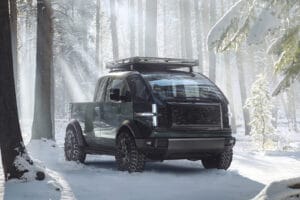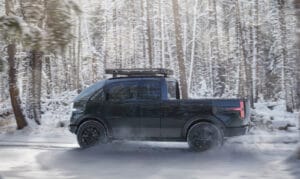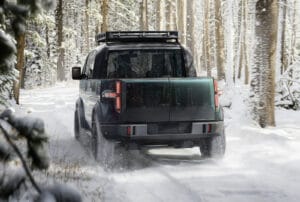
EV startup Canoo added its name to the growing list of manufacturers planning to bring battery-powered pickups to market.
With a design that makes even the Tesla Cybertruck seem tame, the Canoo pickup is designed to serve as both a work and play truck, company officials were set to announce during a “Virtual Media Day” event sponsored by the Los Angeles Auto Show. The as yet-unnamed product joins the other offerings Canoo unveiled last year, including a delivery truck and a toaster-shaped passenger vehicle dubbed the Canoo Canoo.
“We are so passionate about building vehicles that can change people’s lives,” Tony Aquila, executive chairman, Canoo, said in remarks prepared for Thursday’s debut – which is co-sponsored by the Motor Press Guild. “Our pickup truck is as strong as the toughest trucks out there and is designed to be exponentially more productive. This truck works for you. We made accessories for people who use trucks – on the job, weekends, adventure. You name it, we did it because it’s your platform and she’s bad to the bone.”
The numbers don’t tell the full story
Cliches aside, the Canoo pickup will share the same underlying skateboard-style platform as the startup’s delivery van and passenger shuttle. It will measure 184 inches in overall length, with a wheelbase of 112.2 inches. By comparison, a full-size Ford F-150 stretches as long as 250.3 inches, nose-to-tail, depending on cab and cargo bed configuration. The midsize Ford Ranger measures 210.8 inches overall.

But the Canoo pickup’s numbers are misleading. With virtually all drivetrain components mounted under the floorboards, the carmaker effectively eliminated the engine compartment. In this extreme example of cab-forward design, driver and front passenger sit almost immediately behind the nose. As a result, the configuration yields a much larger cabin and cargo bed than the dimensions initially suggest.
To enhance the pickup’s utility, Canoo is adding features such as a bed extender that stretches it from six to eight feet, with enough room on the sides to allow a 4×8 sheet of plywood to lie flat. The bed also has modular dividers for carrying smaller objects without them rolling around. And the bed’s side panels can fold down to serve as tables or workbenches.
Hidden storage and more
With no need for a driveshaft connecting the front and rear axles, the Canoo pickup uses space beneath the bed for pull out storage and hidden steps.

Some of the new EV trucks coming to market, such as the Rivian R1T, retain a more traditional front-end layout with “frunk” storage spaces where an engine would be in a gas or diesel truck. Canoo may have a more van-like nose but it also offers frontal storage space below the windshield, the access door not only serving as a work table but offering electrical power outlets.
The pickup’s battery pack can be used to power tools and other electrical devices, with power ports accessible on the sides of the vehicle, as well.
Full specs to come “later”
In a nod to traditional pickup users, Canoo said the truck “has been designed to accommodate a variety of camper shells to fit as many use cases as possible.”
Other features include bed and exterior lighting, metal skid plates and tow hooks, front and rear.
Canoo says it will release full specifications “later,” but it indicated the pickup will be offered in various configurations, including a single-motor rear-wheel-drive package and another using twin motors for all-wheel drive. The AWD version will produce up to 600 horsepower and 550 pound-feet of torque.

Range is estimated at “200+ miles.” Payload will be a maximum 1,800 pounds.
A soon-to-be-crowded EV pickup market
Equally notable, the Canoo pickup will not only use brake-by-wire, but also steer-by-wire technologies.
The pickup is expected to follow Canoo’s other two models into production. The first, the multi-purpose delivery van, will launch in “small batches” in 2022, according to the automaker, with “full production in 2023.”
That will land the truck on the market about the same time as several other key competitors, including the Rivian R1T, the GMC Hummer Pickup, the Tesla Cybertruck and the all-electric version of the Ford F-150. But, as many as a dozen battery-electric pickups could be on sale before mid-decade, many coming from start-ups including Rivian, Bollinger, Lordstown Motors and Atlas. The question industry observers are struggling to answer is whether there will be enough buyers to absorb all those EV entries.







